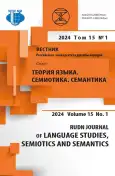Bakhtin’s Philosophical Anthropology in Translation: Rhetoric Devices and Text Cohesion
- 作者: Bruffaerts N.S.1, Moskvitcheva S.A.2
-
隶属关系:
- University of Saint-Louis-Brussels
- RUDN University
- 期: 卷 15, 编号 1 (2024)
- 页面: 64-77
- 栏目: COGNITIVE RESEARCH
- URL: https://journal-vniispk.ru/2313-2299/article/view/323640
- DOI: https://doi.org/10.22363/2313-2299-2024-15-1-64-77
- EDN: https://elibrary.ru/DRFFQX
- ID: 323640
如何引用文章
全文:
详细
The concepts developed by Mikhail Mikhailovich Bakhtin, a Russian theoretiсian of the 20th century, have had an important impact on the evolution of paradigms in humanities. However, his later works on literary theory continue to be far better known than his early essays on philosophical anthropology despite their key role in shaping Bakhtin’s thought. Published achronologically and imbued with innovative terms, Bakhtin’s works were sometimes translated by those who were unfamiliar with his concepts. The purpose of this study is to examine one of the earliest Bakhtin’s essays, Author and Hero in Aesthetic Activity , through a comparative perspective. The analysis is based on its French (1984) and English (1990) translations. It aims at revealing how the mechanisms of text cohesion and rhetoric are rendered in translation in order to convey the author’s ideas. The analysis has shown that the strategies chosen by the translators into French and English do not coincide and vary from ellipsis in French to amplification in English. The choice of coreferential models turns out to play a crucial role in structuring ideas in the target texts.
作者简介
Natalia Bruffaerts
University of Saint-Louis-Brussels
编辑信件的主要联系方式.
Email: natalia.bruffaerts@usaintlouis.be
ORCID iD: 0000-0003-1621-9413
SPIN 代码: 7356-9314
Scopus 作者 ID: 57190029574
D.Sc. (Philology), Associate Professor, Associate Professor of the Department of Russian Language of the Marie Haps’ Translation Faculty
5, d’Arlon str., Brussels, Belgium, 1050IxelSvetlana Moskvitcheva
RUDN University
Email: moskvitcheva@mail.ru
ORCID iD: 0000-0002-8047-7030
SPIN 代码: 9596-7692
Scopus 作者 ID: 57222667811
PhD in Philology, Associate Professor, Department of General and Russian Linguistics, Faculty of Philology
6, Miklukho-Maklaya str., Moscow, Russian Federation, 117198参考
- Bonetskaya, N.K. (2022). S Bakhtin as a philosopher. Action, dialogue, carnival. Saint Petersburg: Aleteiya publ. (In Russ.).
- Todorov, T. (1984). Mikhail Bakhtin: The Dialogical Principle, W. Godzich (trans.). Minneapolis and London: University of Minnesota Press.
- Zbinden, K. (2006). The Bakhtin Circle and Translation. The Yearbook of English Studies, 36(1), 157-167.
- Zbinden, K. (2006). Bakhtin Between East and West: Cross-cultural Transmission. Leeds: Maney Publ.
- Zbinden, K. (1999). Traducing Bakhtin and Missing Heteroglossia. Dialogism, 2, 41-59.
- Nowakowska, A. (2005). Dialogisme, polyphonie: des textes russes de M. Bakhtine à la linguistique contemporaine. In: Dialogisme et polyphonie: Approches linguistiques. J. Bres, P.P. Haillet, S. Mellet, H. Nølke, L. Rosier (eds.). Louvain-la-Neuve: De Boeck. pp. 19-32.
- Suchet, M. (2009). Outils pour une traduction postcoloniale: littératures hétérolingues. Paris: Editions des Archives Contemporaines.
- Bakhtin, M.М. (1979). Avtor i geroj v jesteticheskoj dejatel’nosti. In: Jestetika slovesnogo tvorchestva. S.G. Bocharov (ed.). Moscow: Iskusstvo publ. pp. 9-191. (In Russ.).
- Bakhtine, M. (1984). L’Auteur et le Héros. In: Esthétique de la création verbale. A. Acouturier (trans.). Paris: Gallimard. pp. 25-210.
- Bakhtin, M. (1990). Author and Hero in Aesthetic Activity. In: Art and Answerability: Early Philosophical Essays. V. Liapunov (trans.). Austin: University of Texas Press. pp. 4-256.
- Todorov, T. (1981). Mikhaïl Bakhtine: Le Principe Dialogique suivi de Écrits du Cercle de Bakhtine. Paris: Seuil.
- Coates, R. (2005). Christianity in Bakhtin: God and the Exiled Author. Cambridge: Cambridge University Press.
- Clark, K. & Holquist, M. (1984). Mikhail Bakhtin. Cambridge, Mass. and London: Belknap Press.
- Bocharov, S.G. (1979). Ot sostavitelja. In: Jestetika slovesnogo tvorchestva. M.M. Bakhtin. S. Bocharov (Ed.). Moscow: Iskusstvo publ. pp. 5-6. (In Russ.).
- Emerson, C. (1990). Russian Orthodoxy and the Early Bakhtin. Religion & Literature, 22 (2/3), 109-131.
- Holquist, M. (1990). Introduction: The Architectonics of Answerability. In: Art and Answerability: Early Philosophical Essays. V. Liapunov (trans.). Austin: University of Texas Press. pp. ix-Iii.
- Daneš, F. (1974). Functional Sentence Perspective and the Organization of the Text. In: Papers on Functional Sentence Perspective. F. Daneš (Ed.). Prague: Academia. pp. 106-128.
- Conte, M.-E. (1996). Anaphoric Encapsulation. Belgian Journal of Linguistics, 10(1), 1-10.
- Maurin, A.-S. (2018). Tropes. In: The Stanford Encyclopedia of Philosophy. E.N. Zalta (ed.). https://plato.stanford.edu/archives/sum2018/entries/tropes/
- Halliday, M. & Matthiessen, Ch. (1985). An Introduction to Functional Grammar. London: Hodder Arnold.
补充文件









